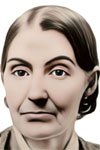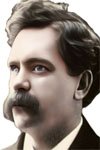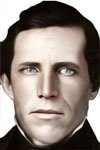| 1826, March 20 | 1827, October | 1830, March | 1832, Summer | 1835 |
|---|---|---|---|---|
| Joseph Smith is convicted for falsely claiming to find buried treasure by looking through a seer stone in a hat. | Joseph begins dictating the Book of Mormon to Martin Harris by looking through a seer stone in a hat. | Book of Mormon published, names the translation device ‘interpreters’. | In his earliest history, Joseph names the translation device ‘spectacles’. | Doctrine and Covenants 10:1 altered to insert ‘Urim and Thummim’ as name of translation device. |
Joseph Smith claims that the Book of Mormon is his translation of an ancient book engraved on gold plates. Perplexingly, according to eyewitnesses, Joseph did not even look at the plates while ‘translating’ them.

In writing for your father I frequently wrote day after day, often sitting at the table close by him, he sitting with his face buried in his hat, with the stone in it, and dictating hour after hour with nothing between us. | |
 | — Emma Smith
Joseph Smith's wife |

I will now give you a description of the manner in which the Book of Mormon was translated. Joseph Smith would put the seer stone into a hat, and put his face in the hat, drawing it closely around his face to exclude the light; and in the darkness the spiritual light would shine. A piece of something resembling a parchment would appear, and on that appeared the writing. One character at a time would appear, and under it was the interpretation in English. Brother Joseph would read off the English to Oliver Cowdery, who was his principle scribe, and when it was written down and repeated to Brother Joseph to see if it was correct, then it would disappear, and another character with the interpretation would appear. | |
 | — David Whitmer
President of the Missouri church and Book of Mormon witness
|
Urim and Thummim
For well over a century, the LDS church emphasized that Joseph Smith used an ancient device called the Urim and Thummim to aid in his translation of the Book of Mormon. The Urim and Thummim are not to be confused with the seer stone.

There were a couple of means that were prepared for this. One was that he used an instrument that was found with the plates that was called the Urim and Thummim. This is kind of a divinatory device that goes back into Old Testament times. Actually, most of the translation was done using something called a seer stone. The seer stone is obviously something like the Urim and Thummim. It seems to be a stone that was found in the vicinity, and I can't say exactly how it would have worked. It may have been a kind of a concentrating device or a device to facilitate concentration. He would put the stone for most of the concentration period in the bottom of a hat, presumably to exclude surrounding light. Then he would put his face into the hat. It's kind of a strange image for us today. | |
 | — Daniel C. Peterson
LDS apologist, Editor-in-chief of the Foundation for Ancient Research and Mormon Studies (FARMS) Review
|
- Unlike the Urim and Thummim, Joseph found the seer stone while digging for a well.

The seer stone referred to here was a chocolate-covered, somewhat egg-shaped stone which the Prophet found while digging in a well in company with his brother Hyrum. | |
 | — B. H. Roberts
Mormon Seventy and Church Historian
|
- The historical record shows that the Urim and Thummim was an afterthought, as no records before 1833 mention the Urim and Thummim in connection with the Book of Mormon translation.
- The Book of Mormon is silent on the Urim and Thummim, but mentions a seer stone (Alma 37:23) and translation aids called ‘interpreters’. Mosiah 8:13, 19; 28:20; Alma 37:21, 24; Ether 4:5
- In Joseph’s earliest history, he calls the translation device ‘spectacles’.

The Lord had prepared spectacles for to read the Book therefore I commenced translating the characters. | |
 | — Joseph Smith
Mormonism founder |
- Doctrine and Covenants 10:1 was altered in 1835 to insert the ‘Urim and Thummim’ as the official device by which Joseph translated the plates.
| Book of Commandments, Chapter IX 1833 First Edition |
Doctrine and Covenants, Section XXXVI 1835 Second Edition |
|---|---|
|
Now, behold I say unto you, that because you delivered up so many writings, which you had power to translate, into the hands of a wicked man, you have lost them, and you also lost your gift at the same time. |
Now, behold I say unto you, that because you delivered up |
Conclusion
- By inserting the Urim and Thummim as the primary translation device, it diverted attention away from Joseph Smith’s reputation of being a *‘money digger’ or ‘glass looker’. He was convicted in New York for deceiving others that he could find buried treasure by looking at a seer stone in a hat.
- Seer stones are associated with divination, which the Bible condemns. Leviticus 19:26, Deuteronomy 18:10, Jeremiah 14:14, Acts 16:16






